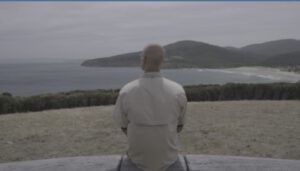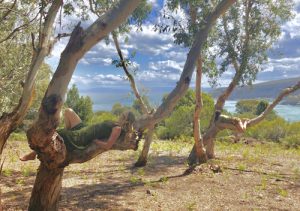This past week ten students and two staff from the local Nubeena high school came to hear me flap my lips and talk about how one might live artistically. Not necessarily as a studio artist, but finding one’s inner soul passion — one’s daemon — and allowing it to breath, not hampered or constricted by convention, society’s rules or even one’s feeling of self doubt; allowing it a front row seat in one’s life. As the bus drove out, I felt the “teacher’s intuition” that these young people would, in their own way, feel “lit from within”.
A fourteen-year-old boy was swimming the Thames in 1757. At the end of the day, and on the banks, alone with wildflowers gold in the evening sun, the child felt lit from within with a sudden wisdom: rather than being forced to learn Latin and Greek, ‘it surely more natural that I should be taught to know all the productions of Nature,’ he thought, so Joseph Banks began teaching himself botany, visiting wise women among the Gypsies well versed in plant medicine and growing into his illustrious career as botanist and naturalist.
Jay Griffiths, ‘Kith’
 Thirteen years later Joseph Banks — by having listened years earlier to his daemon or muse — sailed into Botany Bay, Australia with Captain Cook on the Endeavour and collected the first specimens of the genus Banksia (named in his honour by the son of the man who devised the Linnean system of classification).
Thirteen years later Joseph Banks — by having listened years earlier to his daemon or muse — sailed into Botany Bay, Australia with Captain Cook on the Endeavour and collected the first specimens of the genus Banksia (named in his honour by the son of the man who devised the Linnean system of classification).
As an aside, Carolus Linnaeus the Younger suggested that this new country claimed by Britain should be called “Banskia”. Could have made for a more interesting national flag.
What is it, this sense of fidelity to one’s own inner flame? In the Western tradition, it is known as one’s daemon, one’s calling. Everyone has one, a guiding spirit — though not a fore-ordaining one. It is not the self, but the seed of purpose, the necessity of destiny inheld in earliest childhood, the child sheltering its own adult-to-be as the acorn shelters the future oak.
Jay Griffiths, ‘Kith’
Not surprisingly, our “controlling” early Christian churches took this vital notion of an individual’s inner identity and changed daemon to demon. Time, I think, to re-claim the original, more positive, meaning.
Whenever I see young people looking out over Storm Bay and into the cloudy distance, I want to give them heart, to inspire them in some small way to listen to their own unique inner voices, their daemons, their muses. For their sake, and for the healthy sake of a collective world.
The ancient Greek word for happiness is eudaimonia. Eu meaning, in this case, pleased, and daimonia is the person’s daemon. Certainly then, finding happiness in any of our lives requires us to nurture and give voice to our daemon. As importantly, we as teachers, parents, elders and older members of society must do all we can to help our younger people give birth to this inner calling.






You must be logged in to post a comment.